Friday, April 3rd 2020

Ryzen 7 3700X Trades Blows with Core i7-10700, 3600X with i5-10600K: Early ES Review
Hong Kong-based tech publication HKEPC posted a performance review of a few 10th generation Core "Comet Lake-S" desktop processor engineering samples they scored. These include the Core i7-10700 (8-core/16-thread), the i5-10600K (6-core/12-thread), the i5-10500, and the i5-10400. The four chips were paired with a Dell-sourced OEM motherboard based on Intel's B460 chipset, 16 GB of dual-channel DDR4-4133 memory, and an RX 5700 XT graphics card to make the test bench. This bench was compared to several Intel 9th generation Core and AMD 3rd generation Ryzen processors.
Among the purely CPU-oriented benchmarks, the i7-10700 was found to be trading blows with the Ryzen 7 3700X. It's important to note here, that the i7-10700 is a locked chip, possibly with 65 W rated TDP. Its 4.60 GHz boost frequency is lesser than that of the unlocked, 95 W i9-9900K, which ends up topping most of the performance charts where it's compared to the 3700X. Still the comparison between i7-10700 and 3700X can't be dismissed, since the new Intel chip could launch at roughly the same price as the 3700X (if you go by i7-9700 vs. i7-9700K launch price trends).The Ryzen 7 3700X beats the Core i7-10700 in Cinebench R15, but falls behind in Cinebench R20. The two end up performing within 2% of each other in CPU-Z bench, 3DMark Time Spy and FireStrike Extreme (physics scores). The mid-range Ryzen 5 3600X has much better luck warding off its upcoming rivals, with significant performance leads over the i5-10600K and i5-10500 in both versions of Cinebench, CPU-Z bench, as well as both 3DMark tests. The i5-10400 is within 6% of the i5-10600K. This is important, as the iGPU-devoid i5-10400F could retail at price points well under $190, two-thirds the price of the i5-10600K.These performance figures should be taken with a grain of salt since engineering samples have a way of performing very differently from retail chips. Intel is expected to launch its 10th generation Core "Comet Lake-S" processors and Intel 400-series chipset motherboards on April 30. Find more test results in the HKEPC article linked below.
Source:
HKEPC
Among the purely CPU-oriented benchmarks, the i7-10700 was found to be trading blows with the Ryzen 7 3700X. It's important to note here, that the i7-10700 is a locked chip, possibly with 65 W rated TDP. Its 4.60 GHz boost frequency is lesser than that of the unlocked, 95 W i9-9900K, which ends up topping most of the performance charts where it's compared to the 3700X. Still the comparison between i7-10700 and 3700X can't be dismissed, since the new Intel chip could launch at roughly the same price as the 3700X (if you go by i7-9700 vs. i7-9700K launch price trends).The Ryzen 7 3700X beats the Core i7-10700 in Cinebench R15, but falls behind in Cinebench R20. The two end up performing within 2% of each other in CPU-Z bench, 3DMark Time Spy and FireStrike Extreme (physics scores). The mid-range Ryzen 5 3600X has much better luck warding off its upcoming rivals, with significant performance leads over the i5-10600K and i5-10500 in both versions of Cinebench, CPU-Z bench, as well as both 3DMark tests. The i5-10400 is within 6% of the i5-10600K. This is important, as the iGPU-devoid i5-10400F could retail at price points well under $190, two-thirds the price of the i5-10600K.These performance figures should be taken with a grain of salt since engineering samples have a way of performing very differently from retail chips. Intel is expected to launch its 10th generation Core "Comet Lake-S" processors and Intel 400-series chipset motherboards on April 30. Find more test results in the HKEPC article linked below.

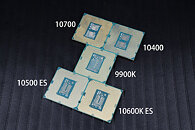
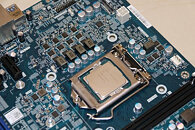

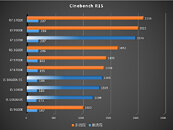
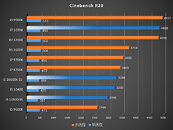
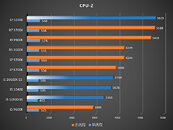
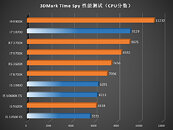
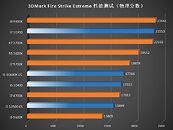
97 Comments on Ryzen 7 3700X Trades Blows with Core i7-10700, 3600X with i5-10600K: Early ES Review
I feel Intel have an advantage in games only because they have the clockspeed advantage (on top of a good CPU architecture), and also the games optimized for limited number of core counts since Intel pretty much capped it at 4 cores for as long as they monopolized the CPU market. As Intel starts to pump out more cores on their chips, it may actually benefit AMD indirectly since games and apps will start getting optimized for more cores.
Also, Intel is able to get away with the clockspeed increase here by feeding the chip more power as you have seen in multiple reviews of the current top end chip from Intel pulling in north of 250W. One thing I do want to point out, and that is even if you are willing to pay top dollars for the fastest Intel CPU, you need to also pay top dollars for a motherboard, a good PSU and cooling to get the CPU to run all core turbo at full speed. What you see in reviews, reviewers tend to use high end components and cooling to achieve the supposed full sustained potential.
Direct shrink probably would not yield that good area reduction either, both Intel and AMD have said IO and some other parts do not scale down all that well and Intel has a bunch of IO and SOC-ish things on the die.
Of all the various workloads where Intel still beats AMD it's down to two reasons; better CPU front-end or peak AVX performance. If AMD wants to become more competitive in these workloads, then they have to improve in those areas.
There is no bias in Windows' scheduler towards Intel's ring bus, Intel's CPUs with mesh networks scales just as fine, please stop spreading this nonsense.
Most games only stresses 2-3 cores, so the change from 4-core to 8-core CCX is not going to be a game changer, pun intended.
Only a fool would claim Intel will be RIP. Sunny Cove is already much better than Skylake, and it's not like they've stopped further development while waiting for 10nm. There will be major architectural advancements from Intel in the next years. This will be the most exciting times in over a decade; two companies finally advancing at the same time.
All is because of the ring bus and bad Windows scheduler..
Just because a random dude on YouTube claims something out of thin air, doesn't make it true. Let's let this nonsense be.
The Mesh CPU is newer.
The conclusion - the ring bus is faster!
Intel RIP... man did I need a laugh today. I appreciate whoever said that.
My whole point of gaming is your only goal and you'll only settle for nothing but the best then it can't be argued anyway but Intel is your only choice and looks to continue to be true even as of the 2020 releases.
I'll switch to ryzen no problem as soon as they can offer me what I want.
The best gaming experience. Period.